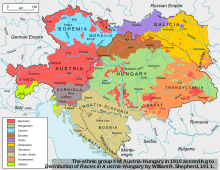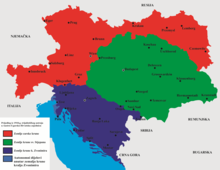



In the history of Austria-Hungary, trialism was the political movement that aimed to reorganize the bipartite Empire into a tripartite one, creating a Croatian state equal in status to Austria and Hungary.[1] Franz Ferdinand promoted trialism before his assassination in 1914 to prevent the Empire from being ripped apart by Slavic dissent. The Empire would be restructured three ways instead of two, with the Slavic element given representation at the highest levels equivalent to what Austria and Hungary had at the time. Serbians saw this as a threat to their dream of a new state of Yugoslavia. Hungarian leaders had a predominant voice in imperial circles and strongly rejected Trialism because it would liberate many of their minorities from Hungarian rule they considered oppressive.[2]
At the end of World War I, its advocates obtained support for a trialist manifesto, but the monarchy as a whole crumbled shortly thereafter.
- ^ "Bosnia-Hercegovina". Eastern Europe. ABC-CLIO. 2005. p. 644. ISBN 9781576078006.
- ^ Tucker, Spencer; Matysek Wood, Laura; Murphy, Justin D., eds. (1999). The European Powers in the First World War: An Encyclopedia. Taylor & Francis. p. 269. ISBN 9780815333517.